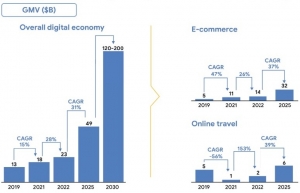Supporting the digital economy space
The interest rate hikes by the US Federal Reserve and other central banks that began to significantly accelerate in the second half of 2022 have impacted the tech industry and investors in significant ways. These hikes are expected to continue, at least in the short term, until the central banks are satisfied that inflation is under control or lose their nerve. When that happens is anyone’s guess.
 |
| Eric Johnson, counsel at Freshfields Bruckhaus Deringer LLP |
This rapidly changing financial environment has made it more difficult for digital economy companies, especially those that are currently not profitable, to raise money in both public and private markets. Many investors have adopted a wait-and-see approach until the situation becomes clearer, and are revisiting the assumptions behind the sky-high valuations that many tech companies previously commanded.
The recent failure of Silicon Valley Bank in the US has sent a shockwave through the tech and venture capital markets, primarily in the US, but with ripple effects that will impact these industries across jurisdictions.
Against this grim backdrop, Vietnam is still well-positioned to attract foreign investment into its digital economy, given its favourable demographics, strong 2022 performance, upskilling of local talent and entrepreneurial spirit.
There are key trends that should continue to make Vietnam an attractive market for foreign investment in the digital economy space, as well as some of the key issues standing in the way of faster development.
Vital trends
First is digital economy supply chains. Export-driven manufacturing remains a critical component of the Vietnamese economy. This sector is supported by government policy, Vietnam’s extensive network of bilateral and multilateral free trade agreements and competitive labour costs.
While textiles, apparel, footwear, spare parts and other low value-added manufacturing continues to make up a large part of the sector, the government has consistently supported Vietnam’s continued ascent up the value chain. These policies, combined with geopolitical concerns around the Chinese market, have resulted in a number of global technology companies shifting a portion of their high-value supply chains to Vietnam or making additional investments in existing operations as part of ‘China +1’ supply chain strategies. Recent examples of this trend include major Apple suppliers opening factories, and the increased investment and expansion of operations in Vietnam by Intel and Samsung. Increasingly, these investments involve research and development.
All indications point to this trend continuing, which translates not only into investment opportunities for global technology companies to enter or expand in the market, but into numerous adjacent opportunities for foreign investors.
Secondly, Vietnam enjoys a young, ambitious and tech-savvy population, who are increasingly well versed in software development, IT and other digital services. The government’s efforts in supporting STEM education will continue to drive this trend, though there is certainly more to do on this front.
The market has seen steady growth in global companies offshoring software development and other digital services to local outsourcing companies. Increasingly, we are seeing these companies setting up their own subsidiaries or acquiring companies with significant capabilities in Vietnam to support growth plans.
As this burgeoning trend continues to develop in Vietnam, opportunities for global tech companies in the Vietnamese market will multiply.
Thirdly, although the sector has been characterised by fierce competition and difficulties in achieving profitability, Vietnamese companies continue to innovate in fintech.
A majority of Vietnamese adults do not have bank accounts or access to other financial services. At the same time, Vietnam has one of the highest smartphone usage rates in ASEAN. This not only provides several opportunities for innovative fintech companies to provide payment services to the unbanked population, but opportunities to offer other digital financial services such as lending, insurance and securities brokerage services.
There are also several dynamic fintech companies working on providing solutions to traditional banking, insurance and securities businesses to offer their customers more streamlined digital access to financial products, several of which have received significant foreign investment. The government has been supportive of fintech companies, though more could be done to remove obstacles and encourage innovation.
Finally, despite the rapid growth of the digital economy sector in Vietnam, the more traditional industries of agriculture and aquaculture remain significant drivers of the Vietnamese economy. Though still relatively new in Vietnam, there are a growing number of companies seeking to offer digital and tech-enabled solutions.
Key issues
While the government has been clear for many years in its support for digitalisation, the practical reality is that the current regulatory environment is too often characterised by inflexibility, inconsistency, and uncertainty.
New digital business models, services and products, almost by definition, do not follow what has come before. This often means that such business models, services and products do not fall squarely within the current legal and regulatory frameworks, which were crafted for a previous generation of businesses.
This leaves digital economy companies with the unenviable choice of proceeding despite uncertainty, which makes attracting foreign investors, who want to know they are investing in legally compliant businesses, difficult or impossible.
The government should seek to develop clear and consistent regulations that allow for more flexibility to foster innovation than current regulatory frameworks.
For example, over the years, there have been numerous pushes to create a regulatory sandbox for fintech businesses. This model, which has been successfully implemented by Singapore and other jurisdictions, should be explored to give room to innovative companies to operate with increased legal certainty and for the government to collaborate more closely with the private sector to craft regulations that support the development of a strong digital economy.
Meanwhile, fast-growing, innovative digital economy companies require significant funding to develop their products and services. For the leading private startups, emerging growth companies and more developed tech companies in Vietnam, this funding tends to come from foreign financial investors.
The hallmark of a supportive financial environment for digital economy companies is a fast and efficient private capital market that is free of uncertainties. For example, in the US and in Singapore, venture capital organisations have produced form legal documents that investors and companies can use as a baseline to facilitate efficient capital raising by digital economy companies.
In Vietnam, the legal and regulatory landscape is still too complex to support such a streamlined approach. While most foreign investment procedures are not insurmountable, they are characterised by extensive documentation requirements, tough foreign investment conditions, delays and inconsistent and unpredictable application of procedures.
The private sector and the government should continue to collaborate to find solutions to these inefficiencies and remove unnecessary roadblocks to streamline and encourage foreign investment.
Furthermore, despite the government’s support for the development of a talented and highly skilled Vietnamese digital economy workforce, obstacles remain that, if removed, could supercharge the next generation of innovators.
For example, the regulations that apply to education and training businesses are often premised on the idea of a brick-and-mortar institution, when in today’s age these activities are increasingly conducted virtually. Removing requirements for physical locations and high capital investment costs that are premised on a brick-and-mortar model could increase the availability of valuable training for the Vietnamese workforce while still ensuring the programmes being offered are of high quality.
Another issue that we increasingly see is the inability for global tech companies to offer members of management in Vietnam the opportunity to participate in global stock option/management incentive plans.
Typically, global digital economy companies will seek to align the incentives of senior management with the performance of the company by offering stock options or grants of shares in the offshore parent company. For early-stage companies which may not be able to offer competitive salaries, these plans are often a major component of the overall compensation packages offered to senior management and can deliver huge upside if the company is successful.
These plans typically involve discounted purchase rights or granting of shares in an offshore company to key members of local management. It is in theory possible to offer such plans to Vietnamese members of management, but in practice, the current requirement to register such plans with the State Bank of Vietnam and the cumbersome, subjective procedures such registration entails, often discourages global tech companies from even trying.
The rules around offering Vietnamese employees such incentive plans should be simplified so that they are not disadvantaged and can participate on the same terms as management in different jurisdictions.
 | Taxes and emissions among growing digital concerns The digital economy in Vietnam has strong growth potential, but faces a number of significant hurdles, including losses in tax revenue, infrastructure challenges, and vast carbon emissions. |
 | Nokia laying groundwork for Vietnam’s digital economy With over three decades of experience in ICT spanning across different countries, Nokia Vietnam general manager Rubén Moron Flores shared his insights with VIR’s Hong Giang regarding Nokia’s plan to bolster the data centre market and ICT infrastructure in Vietnam. |
 | Consumer rights protection online a focus amid e-commerce boom The protection of consumer rights online has been the focus amid the boom of e-commerce and the digital economy since the COVID-19 pandemic, according to the Ministry of Industry and Trade. |
What the stars mean:
★ Poor ★ ★ Promising ★★★ Good ★★★★ Very good ★★★★★ Exceptional
Related Contents
Latest News
More News
- Masan Consumer names new deputy CEO to drive foods and beverages growth (February 23, 2026 | 20:52)
- Myriad risks ahead, but ones Vietnam can confront (February 20, 2026 | 15:02)
- Vietnam making the leap into AI and semiconductors (February 20, 2026 | 09:37)
- Funding must be activated for semiconductor success (February 20, 2026 | 09:20)
- Resilience as new benchmark for smarter infrastructure (February 19, 2026 | 20:35)
- A golden time to shine within ASEAN (February 19, 2026 | 20:22)
- Vietnam’s pivotal year for advancing sustainability (February 19, 2026 | 08:44)
- Strengthening the core role of industry and trade (February 19, 2026 | 08:35)
- Future orientations for healthcare improvements (February 19, 2026 | 08:29)
- Infrastructure orientations suitable for a new chapter (February 19, 2026 | 08:15)

 Tag:
Tag:



















 Mobile Version
Mobile Version